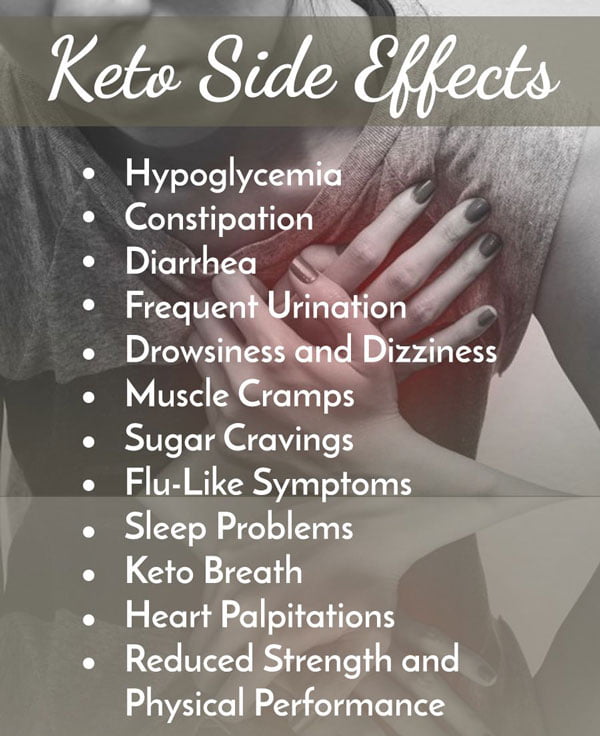The ketogenic diet (low-carb & high-fat diet) is currently a rage in the world of weight watchers and fitness enthusiasts. This puts your body into a metabolic state called ketosis which makes your body more efficient at burning fat. No doubt, it has proven to be immensely beneficial for people trying to shed kilos. But before considering this diet, you’ll probably want to know about the keto diet side effects that are quite common to be expected. However, most of them are only temporary and also harmless. Let’s check out-
ALSO READ: 8 High-Fat Foods (Good Fats) That Are Super Healthy To Eat
Keto Diet Side Effects
Keto Flu
Despite its name, this is not like the flu. Keto flu is a group of some undesirable symptoms that may show up in the first few days after changing what you eat. During the initial days of a keto diet, you may experience these side effects- headaches, tiredness, lethargy, brain fog, irritability etc. These are caused by the body adapting to a new diet consisting of very little carbohydrates. This drastic reduction can come as a shock to the body and may cause withdrawal-like symptoms.
For most people, the keto flu only lasts about a week.
Dizziness & Drowsiness
Sodium is a crucial electrolyte because it helps your body regulate blood pressure and fluid levels. That is why, initially on the keto diet, when your body excretes too much of water, your sodium level goes down. And you may experience a temporary decrease in physical and mental performance. This can make you feel dizzy and lightheaded.
Muscle cramps
While adapting to the keto diet, your body loses water which may create an electrolyte imbalance. All this occurs in response to decreased levels of blood sugar and the hormone insulin. This dehydration and loss of minerals increase the risk of muscle cramps.
ALSO READ: Top 10 Ketogenic Diet Myths Debunked: Low-Carb Diets
Bad breath
Bad breath is actually a common side effect. Many people on ketogenic diets and similar diets report that their breath takes on a fruity smell. This is caused by elevated ketone levels.
As your body reaches ketosis, it starts forming acetone which is released from the body through exhalation. This is what gives the breath a sharp and pungent smell like overripe fruit or nail polish remover.
Insomnia (inability to fall or stay asleep)
Carbohydrates, the body’s main source of energy, improve the entry of the amino acid L-tryptophan into the brain. L-tryptophan helps in the production of serotonin, a neurotransmitter, which contributes to better sleep and well-being. Because of carb restriction in the ketogenic diet, serotonin levels reduce and thus you may experience interrupted sleep and insomnia.
Also, a sudden increase in fat intake can lead to digestive issues. This may even make it difficult for you to fall asleep peacefully at night.
ALSO READ: Constipation Relieving Yoga- 6 Poses For Quick Relief
Frequent urination
As you start the keto diet, you will find yourself urinating more often than usual. This happens because the body loses its glycogen, the storage form of carbohydrates, which holds water in the body. So, you release more water by urinating. Frequent urination leaves you dehydrated which causes a number of additional side effects.
ALSO READ: Fat Burning Drink Recipe- Taapsee Pannu’s Fitness Secret
Digestive Issues
Whenever you make a big change to your diet, there’s the chance it will affect your gastrointestinal health.
In keto diet, you need to cut back on carbs which creates a lack of fibre in the body and this can lead to constipation. Same way, diarrhoea can also be due to a lack of fibre in the keto diet.
So, following this diet can negatively impact your digestion and gut in the long run which can also lead to gas, bloating, abdominal cramps etc.
Low Blood Sugar
It’s quite common to experience short-term episodes of low blood sugar as the sugar intake is drastically reduced. Especially, if you have type 2 diabetes and are on medication, a dramatic change in your carbohydrate intake can put your blood sugar levels at risk of dipping to dangerously low levels. This might make you tired, hungry, or shaky until your body adjusts.
ALSO READ: Low Sugar Fruits- Perfect For Ketogenic Diet & Diabetes

How To Manage Keto Diet Side Effects?
Apart from patience and consistency, the following tips will help you get through these keto diet side effects.
Drink Plenty Of Water
Since carbohydrates are responsible for retaining water in the body, it’s crucial that you increase your water intake to get the most out of the low carb, high fat ketogenic lifestyle. Drink at least 2 litres of water a day. Staying hydrated can help with symptoms like fatigue and muscle cramping.
ALSO READ: Avoid Keto Diet In 9 Health Conditions As It Is Not Safe
Replenish Your Electrolytes
To replace lost electrolytes such as sodium, potassium, calcium, and magnesium, make sure to consume a diet rich in these micronutrients.
When carb intake is reduced, sodium, a crucial electrolyte, gets excreted in large amounts. Try to replenish salt intake by adding it to foods or drinking broth. A diet rich in minerals may help relieve muscle cramps. Opt for low-carb, electrolyte-rich fare, such as leafy green vegetables, avocado and broccoli, to replenish these nutrients.
Avoid Strenuous Exercise
No doubt, exercise is essential for staying healthy and keeping body weight in check, but strenuous exercise should be avoided. When experiencing keto-flu symptoms. It is better to give your body a rest. So, strenuous activities like intense biking, running, weight lifting etc. should be avoided. Don’t push yourself too hard and stick to moderate levels of exercise like walking, yoga or leisurely biking.
ALSO READ: 8 Best Indoor Exercises (Without Equipment) That Burn Fat
Try A Low-Carb Diet First
Before starting a ketogenic diet, try to consume fewer carbs in your diet. Reducing your carbs to a moderate amount will make your transition to very low carb (keto) diet easier.
Eat More Frequently
Initially, when you start following a keto diet, don’t go for long hours without food. Make sure to have your meals at regular intervals of time. Skipping meals can cause hypoglycemic reactions in the body.
And if you are diabetic, you should monitor your blood sugar frequently when starting a low-carb diet and work with your doctor to safely reduce your medication.
